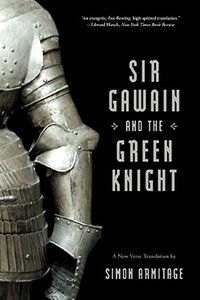Take a photo of a barcode or cover
Enjoyable! I haven't read anything like this since high school, but other than a few obscure stanzas, I found I could follow it reasonably well. I was grateful for the introduction, which gave an overview of the plot and the poetic form that the translator tried to keep to. It was short, at xiii pages for the introduction and 54 pages for the main text.
This review turned into an essay, but for those who are tl;dr: Very well-put-together plot, for a fairy tale, with a surprise twist at the end. Would read again.
The story is about one of the knights of the Round Table, Sir Gawain, and his encounter with the Green Knight. It's the original trope: Arthur and his knights and court are celebrating at New Years, when an unknown, massive man dressed in green intrudes and demands a contest with one of the renowned knights. The contest is simple: that day, the knight will be permitted one chop at the Green Knight's neck with a huge, razor-sharp axe. In one year's time, the Green Knight will take his turn and chop off the knight's head.
Of course, the contest is somewhat fundamentally flawed because the Green Knight would presumably be dead. Nobody really knows what to do, but the Green Knight insults Arthur until he agrees to it. Gawain steps up, chops the Green Knight's head off, which rolls across the floor all spurting and bloody. Whereupon the Green Knight goes and picks it up, dusts it off and the head declares that Gawain needs to meet him in a year's time at the Green Chapel. Then he rides off.
Gawain doesn't know where the Green Chapel is, but heads off after All Hallows the next year to courageously meet his doom. At Christmas, he still hasn't found it, and he prays that he'll find some place to spend Christmas Day and pray and stuff. And lo! a wild castle appears. Gawain is welcomed gladly and he spends the next week in revelry and enjoyment. The master of the castle knows where the Green Chapel is so Gawain can just bide his time till the New Year.
Gawain and the lord of the castle have a deal: if the lord feeds him his stories and his hunted meat, Gawain will give the lord anything he received during the day. The lady of the castle is very beautiful and very agreeable. She tempts Gawain three times, one per day, while her husband is out hunting. Each night, Gawain kisses the lord the number of times that the lady kissed him. (Medieval logic! She wanted Gawain to do much more than that. If he had, this would have been a very different book).
On the last day before he leaves, the lady begs Gawain accept a token of her love. He refuses a ring, but then she offers her girdle, claiming it will protect him from harm. Gawain is all "eh, why not? I've been good!" and accepts the girdle. When the lord asks Gawain that night, Gawain doesn't give back the belt. I think he fell just a little bit in love with the lady.
On the hunt for the Green Knight, Gawain goes out to where the Green Chapel is, and the knight is there. Sharpening an axe, of course! The Green Knight tells him to stay still, and Gawain does it. The Green Knight makes two false blows, not hitting Gawain, while teasing him with his death. Gawain is getting pretty pissed.
On the third strike,the Green Knight gashes open the side of Gawain's neck, and then reveals that he is the lord of the castle. He explains that it was all a test for the knights. Morgan Le Fay was behind it all, because she'd heard that the knights were proud. She magicked the lord so that he was green and invulnerable. Gawain had proven himself fallible because he took the trinket from the lord's wife, and for that he got a gash on the neck.
Excellent value for the $1 I paid for it at the used book store.
This review turned into an essay, but for those who are tl;dr: Very well-put-together plot, for a fairy tale, with a surprise twist at the end. Would read again.
The story is about one of the knights of the Round Table, Sir Gawain, and his encounter with the Green Knight. It's the original trope: Arthur and his knights and court are celebrating at New Years, when an unknown, massive man dressed in green intrudes and demands a contest with one of the renowned knights. The contest is simple: that day, the knight will be permitted one chop at the Green Knight's neck with a huge, razor-sharp axe. In one year's time, the Green Knight will take his turn and chop off the knight's head.
Of course, the contest is somewhat fundamentally flawed because the Green Knight would presumably be dead. Nobody really knows what to do, but the Green Knight insults Arthur until he agrees to it. Gawain steps up, chops the Green Knight's head off, which rolls across the floor all spurting and bloody. Whereupon the Green Knight goes and picks it up, dusts it off and the head declares that Gawain needs to meet him in a year's time at the Green Chapel. Then he rides off.
Gawain doesn't know where the Green Chapel is, but heads off after All Hallows the next year to courageously meet his doom. At Christmas, he still hasn't found it, and he prays that he'll find some place to spend Christmas Day and pray and stuff. And lo! a wild castle appears. Gawain is welcomed gladly and he spends the next week in revelry and enjoyment. The master of the castle knows where the Green Chapel is so Gawain can just bide his time till the New Year.
Gawain and the lord of the castle have a deal: if the lord feeds him his stories and his hunted meat, Gawain will give the lord anything he received during the day. The lady of the castle is very beautiful and very agreeable. She tempts Gawain three times, one per day, while her husband is out hunting. Each night, Gawain kisses the lord the number of times that the lady kissed him. (Medieval logic! She wanted Gawain to do much more than that. If he had, this would have been a very different book).
On the last day before he leaves, the lady begs Gawain accept a token of her love. He refuses a ring, but then she offers her girdle, claiming it will protect him from harm. Gawain is all "eh, why not? I've been good!" and accepts the girdle. When the lord asks Gawain that night, Gawain doesn't give back the belt. I think he fell just a little bit in love with the lady.
On the hunt for the Green Knight, Gawain goes out to where the Green Chapel is, and the knight is there. Sharpening an axe, of course! The Green Knight tells him to stay still, and Gawain does it. The Green Knight makes two false blows, not hitting Gawain, while teasing him with his death. Gawain is getting pretty pissed.
On the third strike,
Excellent value for the $1 I paid for it at the used book store.
adventurous
medium-paced
Plot or Character Driven:
Plot
Strong character development:
Yes
Loveable characters:
No
Diverse cast of characters:
No
Flaws of characters a main focus:
Yes
adventurous
mysterious
Aside from a few odd moments in translation, I thought this flowed and felt very fresh. Rendered the poem as lively, vivid, and entertaining. I'm halfway through Tolkien's version, and I kind of imagine Armitage's feels truer to the effect of the original poem on its original audiences.
I can't help putting this in conversation with Tolkien and the 2021 movie in my mind.
Still not sure how I feel about the poem itself. Overall, positive? I think it gently mocks Arthurian court and knights like Gawain, who are lauded though they're completely unproven in conflict. A lot of, what the heck has Gawain even done, except act with naive bravado and selfishness? Probably because the point is in part that earthly deeds just get you so far, we're all sinners, repent so the Christian God can truly save, etc.
So, the poem seems to be one of those that appropriates pagan imagery to make Christianity more palatable. I don't mind the principle of hybridization. In practice, for me this gets tricky at the ending, where it frames women as devilish Eves *and* agents of God, testing men on his behalf. All over the place, imo, but the ambiguity is neat.
I can't help putting this in conversation with Tolkien and the 2021 movie in my mind.
Still not sure how I feel about the poem itself. Overall, positive? I think it gently mocks Arthurian court and knights like Gawain, who are lauded though they're completely unproven in conflict. A lot of, what the heck has Gawain even done, except act with naive bravado and selfishness? Probably because the point is in part that earthly deeds just get you so far, we're all sinners, repent so the Christian God can truly save, etc.
So, the poem seems to be one of those that appropriates pagan imagery to make Christianity more palatable. I don't mind the principle of hybridization. In practice, for me this gets tricky at the ending, where it frames women as devilish Eves *and* agents of God, testing men on his behalf. All over the place, imo, but the ambiguity is neat.
I've wanted to read a translation of Sir Gawain and the Green Knight ever since watching the film adaptation starring Dev Patel, and while the adaptation certainly took some liberties with the story, the heart of it remains true. This 14th century chivalric romance certainly entertains, and it is filled with intrigue and mystery. W. S. Merwin's translation abounds with lyricism and sumptuous description wile remaining faithful, as far as I could tell, to the Middle English text (and I liked that the two were placed side-by-side for comparison). I look forward to comparing this translation against others in due time.
I liked this; it was overall really interesting and held my interest unlike most medieval texts. I also enjoyed the little twists at the end of the book.
Having recovered enough from English Literature classes in school to read "The Poetry Pharmacy" by W. Sieghart, and thoroughly enjoying it, I thought I'd next try to read a longer form poem; Sir Gawain and the Green Knight (Simon Armitage's modern rendition) was my choice.
I love folk stories and hoped this poem would feel like something recounted by a Bard, fireside. It does! Alliterative verse is not something I'd ever read before and is very different to what I expected, so Armitage's foreword about reading the poem out loud really helped me get into the book.
I am a poetry layman, but I think this book is very very good. It was more fun to read than I'd hoped, and entertaining throughout. It is super interesting, quite funny and a great story. Nothing is too serious, nor light-hearted and the plot is complex enough to be interesting, but remains straightforward. I'd recommend this to anyone, easily.
I love folk stories and hoped this poem would feel like something recounted by a Bard, fireside. It does! Alliterative verse is not something I'd ever read before and is very different to what I expected, so Armitage's foreword about reading the poem out loud really helped me get into the book.
I am a poetry layman, but I think this book is very very good. It was more fun to read than I'd hoped, and entertaining throughout. It is super interesting, quite funny and a great story. Nothing is too serious, nor light-hearted and the plot is complex enough to be interesting, but remains straightforward. I'd recommend this to anyone, easily.
I first read this book as part of a class on early english literature and the story has really stuck with me. As a morality tale [b:Sir Gawain and the Green Knight|3049|Sir Gawain and the Green Knight (Signet Classics)|Anonymous|http://photo.goodreads.com/books/1161975206s/3049.jpg|2954048] just plain works, the decisions made by Gawain are by no means easy, and over the course of his tale all of his flaws are laid bare. Though hundreds of years old, his willingness to take responsibility for his actions and his king still feel refreshing.
Perhaps more interesting, is how often this tale is referenced in Popular culture. The story has been remade into a movie starring Sean Connery, and The Green Knight himself has appeared in multiple video games (and an episode of The Simpsons if memory serves).
Overall I would heartily recommend this story to nearly anyone, it is excellent.
Perhaps more interesting, is how often this tale is referenced in Popular culture. The story has been remade into a movie starring Sean Connery, and The Green Knight himself has appeared in multiple video games (and an episode of The Simpsons if memory serves).
Overall I would heartily recommend this story to nearly anyone, it is excellent.
no idea what to rate it. was fighting to get to that ending. i love the female characters. wtf is going on tbh. oh well whatever. girl power come on.



